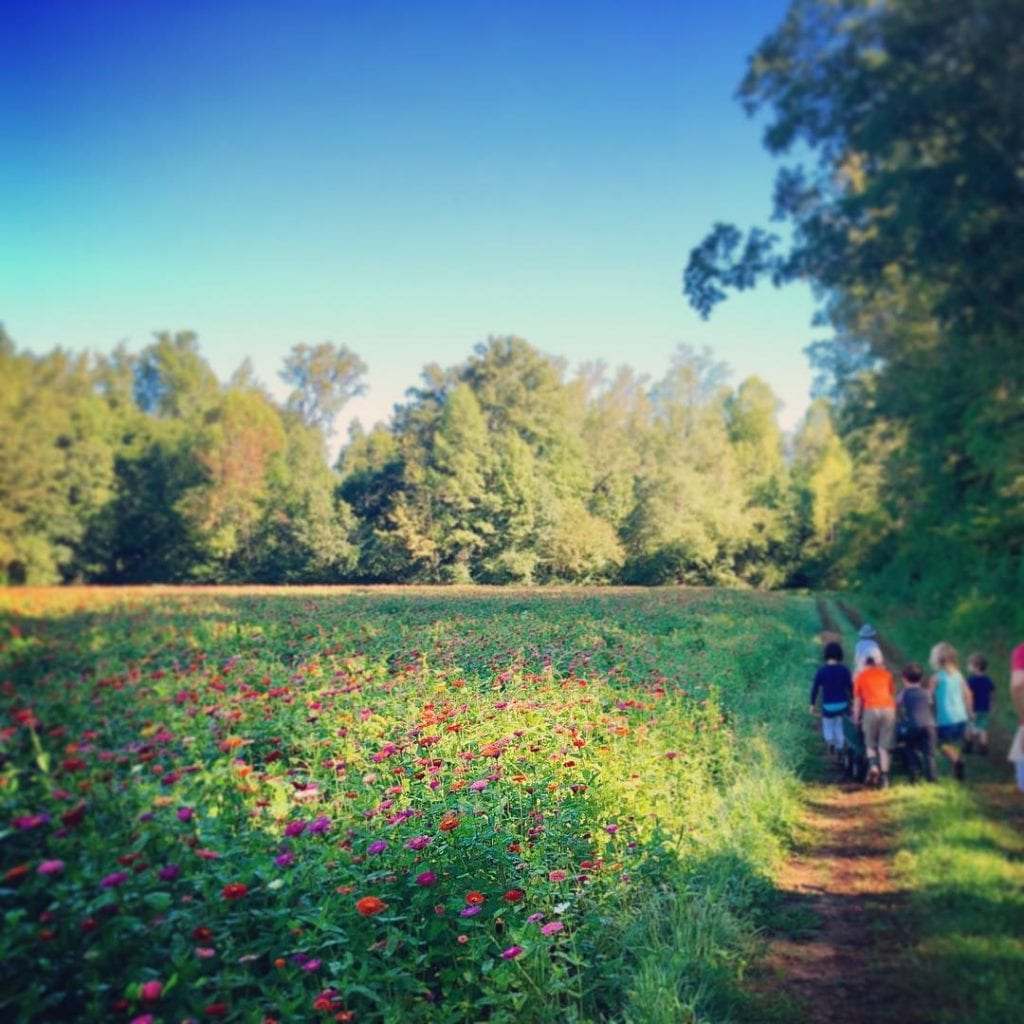
Growing up, the neighborhood kids and I had a special place where we liked to play. We called it, “the dirt field” and that is exactly what it was — a large wide-open space of red clay with a small patch of trees on the backside of a neighboring farm. We loved it, because it was our space. Kids of all ages would regularly gather to try new things and play for hours on end.
Best of all, there were no adults around to see the kinds of “shenanigans” we were up to! There was no one to tell us that our homemade ladder (that extended up to the top of our rickety tree house!) was not sturdy. Or no one to tell us that the bike ramps we rigged up with scrap wood and tree stumps were unsafe. We went along with any and all crazy ideas — having fun until the sun went down.
This childhood memory may resonate with some of you, but for present day child, this kind of play is almost obsolete. Yet, from my experience, when children of today ARE given opportunities for real, messy, unrestricted, “risky,” and child-directed play — they are reaping the very benefits we had as children. In fact, they attain something far more valuable than just memories. They gain confidence.
“The exhausting cycle of constantly monitoring their work and performance…makes children feel less competent and confident.” – Elizabeth Kolbert
We are living in a time where adults feel the need to control (even play scenarios!) and safety is of utmost importance. More than ever before, it is paramount for the well-being of the child, that adults give back some of that control and allow children to have a say in how they spend their time.
When I look around our play space at TimberNook, watching the children engage in advanced play schemes – I am immediately taken back to my own childhood. It reminds me that children do know how to make their own play decisions, evaluate risk effectively, and practice social skills with other children. They just need the opportunity to do so.
There are several key ingredients to a successful day at TimberNook: time, space, and opportunity. And while not all children feel immediately at ease with these freedoms; the promise of time, space, and opportunity are there as a gentle reminder that children have a choice here. They are never rushed or coerced into doing anything – lending itself nicely to a sense of peace that fosters quiet confidence.
According to a research study from the University College London “Four out of five children say they feel more confident in themselves after spending time participating in outdoor activities” (Walker)
Not long ago, we had a 12-year-old boy attend TimberNook. He was kind, positive, and soft-spoken. When he first started, he spent his days alone – observing and taking it all in. We could tell that his prior experiences in the woods had been limited and that he wasn’t completely at ease with the freedoms he had. It was almost as if he didn’t know what to do with himself at first.
When asked to join a group, he would politely shy away. When invited to try a new experience (like shelter building or tool making), he would again politely decline. Yet, he was always watching in close proximity.
He shared in our closing circle at the end of each day how he “just loved being out there and he was happy about meeting new friends!” We never forced participation. Friends gave him space, yet continued to invite him to join in the play.
Time, space, and opportunity were continuously offered, and within a few weeks, he blossomed! One afternoon, he asked for help tying Para cord for a tarp shelter. He needed help figuring out how to attach the tarp to his lean-to. His fine motor skills were a bit weak and threading the cord through the eyelet wasn’t easy, nor was tying. With some encouragement and modeling from peers, he did it.
That moment was the first of a long list of attempts, failures, re-attempts, and successes over the weeks. He eventually learned to make a handcrafted bow from a tree sapling. He made another and improved tremendously on the 2nd one!
Next, he asked to use a pocketknife to whittle a point for handmade arrows, showing his growing willingness to take risks. With each small success, he advanced himself towards a harder task. He worked diligently each week, mastering new skills and glowing with pride.
He also grew in his stamina and attention for tasks, participation in group games, initiation of and engagement in social conversations, confidence and self-assurance, his ability to experience and express joy, and he began to truly PLAY. This was a huge change and quite possibly a life-changing experience for this child!
We call this kind of story, “TimberNook Magic.” Does this mean that TimberNook is truly magic? No, certainly not. It is likely the many components that make up the TimberNook philosophy that foster this kind of change.
It was being in nature. It was the time and space. It was the environment. It was the inspiration. It was the other children. It was the respect, trust, and patience from the adults. It was providing him with the autonomy to say when he was ready to participate.
TimberNook providers all over the world are full of stories just like this. One transformational story at a time, we can share how simple it is to bring back the freedoms of childhood. These “magical” play experiences can restore and build both confidence and competence in our children.
Christa Thomas
TimberNook of West Georgia
Christa Thomas has a Bachelors degree in Early Childhood Education and has taught in both the private and public school settings. Her unique teaching philosophy and background in the Reggio Emilia approach has helped provide authentic learning experiences for children of all ages. Christa and her husband, Marty are currently homeschooling their two adventurous boys. Nature plays a huge role in their family life. They enjoy hiking and camping as a family. They are also passionate about caring for animals and growing clean healthy food on their suburban mini-farm. Christa’s desire for learning outdoors led her to TimberNook and she is on a journey to share it with her community.
Sources:
Walker, Rowan.”Spending Time in Nature Can Improve Children’s Confidence.” MedicalExpress.com, 11 November 2019, https://medicalxpress.com/news/2019-11-nature-children-confidence.html
Markham, Laura. “12 Ways to Raise a Competent, Confident Child with Grit.” psychologytoday.com, 5 June 2015
https://www.psychologytoday.com/us/blog/peaceful-parents-happy-kids/201506/12-ways-raise-competent-confident-child-grit
